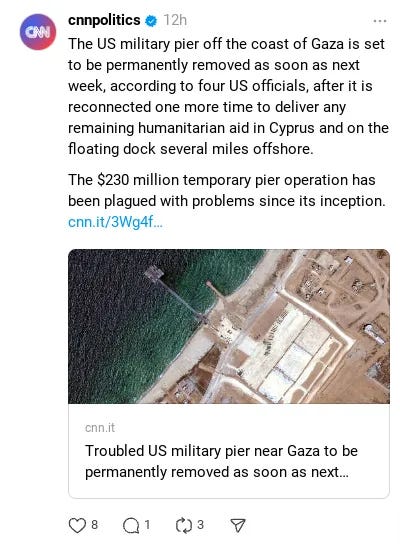Hi everyone!
Each week, in The View from the Front podcast, I cover the news in a sophisticated and balanced manner, with an over-arching goal to unify our country.
Besides covering the news in a respectful way, I end each show with some motivation and wisdom. Hope you enjoy the show! #SupportOurMilitary #DefendDemocracy
Thank you for being here. And thank you to those of you whose paid subscriptions make it possible for me to devote time and resources to researching and compiling the news each week.
If you’d like to support the show:
You can subscribe with Substack: https://stanrmitchell.substack.com/subscribe
You can also now sign up at Patreon: https://www.patreon.com/stanrmitchell
Or send a tip through Venmo (@authorstanrmitchell): https://account.venmo.com/u/authorstanrmitchell
Finally, I’m still trying to grow the show. Please rate and leave comments on SPOTIFY, APPLE, or wherever you listen.
You can listen here, or you can find the podcast on your favorite channel below by searching for The View from the Front:
Selected source notes for podcast and transcript above.
U.S. news:
While JLOTS Mission Has Concluded, Several Million Pounds of Aid Remain to be Delivered
The U.S. military Joint Logistics Over-the-Shore system, or JLOTS, in use since May to deliver humanitarian aid into Gaza, has closed out its mission, U.S. Central Command announced yesterday.
But Centcom remains committed to delivering several million pounds of aid originally destined for delivery using that system, said Deputy Pentagon Press Secretary Sabrina Singh during a news briefing.
"In the coming days, Centcom will work with USAID to deliver the remaining aid commodities, currently afloat, to the port of Ashdod, in Israel, for onward distribution to Gaza, and will provide coordination and liaison support for humanitarian aid delivery as a request of USAID when appropriate," Singh said.
Due to sea states, the JLOTS pier has not been in operation in Gaza since late June. That pause in operations, coupled with the announced shuttering of the mission, will require about five million pounds of humanitarian aid once designated for delivery over the JLOTS pier to be delivered through the Israeli port of Ashdod.
That aid, Singh said, is either in Cyprus, or "afloat," in that it is currently either on commercial shipping vessels or U.S. military vessels underway on the Mediterranean Sea.
In early May, the Defense Department completed deployment of the JLOTS in the Mediterranean Sea. This included a floating pier several miles off the coast of Gaza as well an additional pier, referred to as the Trident Pier, anchored on the Gaza shore.
The mission was then carried out in multiple steps. Commercial cargo ships loaded with humanitarian aid in Cyprus sailed to the floating pier. There, at sea, cargo was unloaded from the commercial ships and onto trucks that were aboard Army-owned logistic vessels.
After leaving the floating pier, the Army vessels traveled to the Trident Pier. There, the trucks exited the Army vessels and moved aid over the pier to the shore, where the humanitarian aid supplies could then be staged for delivery inside Gaza.
Singh said the mission was successful.
"With collaboration from 12 nations, international partners, USAID, and the United Nations, the temporary pier successfully delivered nearly 20 million pounds of aid, which is the highest volume of humanitarian assistance the U.S. military has ever delivered into the Middle East," Singh said. "The temporary pier achieved its goal of providing an additive means of delivering high volumes of humanitarian aid to the people of Gaza."
Going forward, Singh said, the U.S. military will play an advisory role, at least for the short term, in the continued delivery of aid, which is expected to go through Ashdod and then over ground routes into Gaza.
"In the immediate future, we're going to maintain some coordination elements that have been in place, such as the coordination cell ... in Cyprus and in Israel. We want to make sure that aid is going to continue to flow into Gaza," she said. "But this new route, that aid flows through Ashdod, will ultimately be managed by USAID and other humanitarian organizations ... I'd include the World Food Program in that as well."
Ukraine news:
Opinion: With U.S. aid flowing, Ukraine’s defense stiffens — for now
Michael Kofman, an analyst at the Carnegie Endowment for International Peace who recently returned from visiting Ukraine, wrote on X: “Ukraine faces difficult months of fighting ahead, but the situation at the front is better than it was this spring.”
…
The biggest danger to Ukraine at the moment is not from a Russian ground assault but from the air. Last week’s Russian missile strikes, which hit a children’s hospital in Kyiv and killed at least 37 people, are a reminder of the constant menace. Kofman notes that “Ukraine is very low on ammunition for legacy Soviet [air defense] systems, whereas Russian drone and missile production rates have increased significantly.”
The Russians have had particular success in recent months in targeting Ukraine’s energy infrastructure. Ukrainian officials say Russian strikes have taken offline nine of the 18 gigawatts that the country needs for peak consumption this winter. Electricity is already being rationed, and it could be limited to as little as five hours a day in the winter. As Ukrainian officials have been saying since the start of the war, they are in desperate need of more air defenses, to protect not only their cities and infrastructure but also their front-line positions. Ukrainian troops have suffered devastating damage from Russian “glide bombs,” as stockpiled dumb bombs retrofitted with cheap guidance kits are called.
At last week’s NATO summit, the allies announced that they were sending dozens of new air defense systems to Ukraine, including at least four U.S.-made Patriot batteries, the most effective system for stopping Russian missiles. Talks are underway for Israel to contribute as many as eight of its own earlier-generation Patriot batteries, which it no longer needs. The imminent delivery of F-16s from the Netherlands and Denmark should help, too: Those fighter aircraft can chase away the Russian bombers dropping glide bombs.
China news:
Background article from June: Philippine Sailor Severely Injured, Vessels Damaged as Chinese Block South China Sea Mission
Defense Official Says U.S.-Philippines Alliance Is Making Remarkable Progress
Part of this vision is the United States standing with the Philippines as the nation defends its lawful rights in the South China Sea, Ratner said. China is challenging the Philippines' lawful right to the Second Thomas Shoal, a "low-tide elevation beyond any lawful territorial sea, on the Philippines' continental shelf, and well within the Philippines' exclusive economic zone," Ratner said.
China's claim on the Shoal "has no more credibility today than it did when the arbitral tribunal issued its unanimous ruling in 2016," he said. "And the kind of revisionism and coercion we've seen there from [China] is both destabilizing and dangerous."
This aggressive Chinese behavior stands in sharp contrast to the remarkable leadership by President Marcos to protect and defend the rights of the Philippines under international law, Ratner said.
"All the while, the United States has acted in support of the Philippines and made clear that our alliance commitments are ironclad and that all nations should be able to fly, sail and operate wherever international law allows," Ratner said.
…
The Philippines is working alongside Japan, South Korea, Australia, New Zealand and other nations of the region in these exercises.
These like-minded nations are moving toward greater interoperability and cooperation, Ratner said. They are granting reciprocal access. They are also engaging in more complicated and complex regional exercises. "The new convergence in the Indo-Pacific won't always start with or include the United States, nor should it," Ratner said.
South China Sea Arbitration Ruling: What Happened and What’s Next?
Gift link from The Washington Post: Why does China care about a rust bucket in the middle of the sea?
China brokers Palestinian unity declaration in bid to be global mediator
Leaders of Palestinian factions, including Fatah and Hamas, signed a joint statement Tuesday in Beijing aimed at ending divisions between the bitter rivals, a deal bolstering China’s claim to being a global mediator but unlikely to heal the deep rift between the Palestinian political groups.
The statement calls for the formation of a Palestinian unity government overseeing the West Bank, Jerusalem and the Gaza Strip and eventually holding elections, for which the leaders of the factions would meet and draw up a road map. The Israeli government has rejected any proposal that gives a governing role to Hamas or the Fatah-controlled Palestinian Authority.
Chinese media hailed the “Beijing declaration” as a breakthrough and a sign of the country’s emerging role as a peace broker in faraway conflicts. In a speech after the talks ended, Chinese Foreign Minister Wang Yi called it a “historic moment for the cause of Palestine’s liberation” and highlighted the “consensus around establishing an interim national reconciliation government to manage Gaza after the war.”
Motivation and wisdom:
Here’s some motivation and encouragement for you, because I know that life is hard and pep talks help. I also know that sometimes you can get too close to a situation and not be able to see what’s happening, so I share some quotes of wisdom alongside these motivational quotes in the hopes that maybe just one might speak to you.



I always like to share a few from the Bible, or that touch on Jesus, because Christianity and the Bible have become such a source of strength and wisdom and calm for me during the past couple of years.
And I hope by sharing a few, it might encourage you to get into the Bible yourself. Because I think it’ll really help you.
And, I always like to end each week’s notes with this one:

And with that, thanks for joining us this week on The View from the Front.
If you can, consider at some point becoming a paid subscriber.
That’s it for this edition.
Love my moderate, optimistic view of politics and want to know more about how I see things?
Go here:
Dealing with PTSD? Emotionally or mentally at rock bottom? Here’s the link to my faith newsletter: Be like Ozzie; go near your master. (The power of prayer. Part 1.)
As a reminder, please be kind and try your best to love your fellow Americans.
So many men and women have sacrificed, fought, and died to keep this country together the past 240-plus years. Please work daily to unite our country again. The vast majority of Americans are decent, loving, great people.
Also, please try to be a better person each and every day. Try to be kinder on social media and how you interact with others with whom you disagree.
Please join me again in our next episode, and please stay safe until then.
Love and peace,
Stan R. Mitchell
P.S. Don’t forget that I've also written twelve fast, exciting books.
Finally, I also write a faith blog about God and the Bible. (As a child, I was wounded badly by the church and left it to study other religions, before returning to the faith of my roots.)
#mil #podcast #military #ukraine #china #russia #RussiaUkraineWar #motivation #inspiration #Bible #usmc #army #navy #airforce #politics #defensenews #OSINT #theviewfromthefront




























